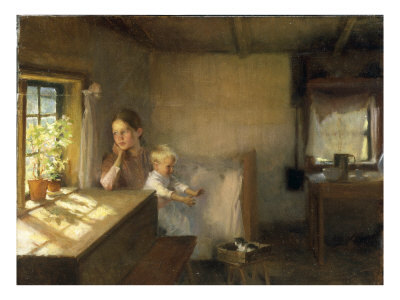"Hate the enemy enough, any sacrifice is justified. See the other side as 'some mother's sons', you are less willing to sacrifice your own." -- Roger Ebert
Women and men are wired differently; men generally prefer the objective, impersonal approach to conflict, dealing with problems swiftly and decisively.
Women tend to see issues as more personal -- 'people-related' issues that can be resolved over time for the good of all. They tend to solve family problems through incentives and initiatives -- through cooperation -- realizing that in most cases the solutions won't necessarily be decisive or swift; they involve building trust through a set of skills relating to successful conflict resolution and learning to work together for the good of the family/society.
For example: one toy, two children arguing for it. The father may tend to just take away the toy, thereby solving the problem, while the mother may tell them they must take turns; each can play with it for five minutes, then give it to the other. She will set a timer for them. Or, she may encourage them to play together with it. This process involves trust in the mother to fulfill her promise while teaching patience with a long-term vision.
As the children grow older, moving into progressively more complex societal situations, they will already have a foundation for negotiating their way through them, with parental guidance.
Grassroots resolution of societal conflicts is taking place in India, Palestine, Africa, Afghanistan, Colombia and elsewhere.
The 1996 film Some Mother's Son, set in Northern Ireland during 'The Troubles,' explores the thinking of mothers with sharply conflicting viewpoints as they come to terms with the issue of whether or not to prolong the lives of their sons. The sons, on hunger strike in a British prison, have fallen into near-death comas; the mothers are left to decide about life support. The women gradually begin to understand each other's positions, and to come to terms with their own and the others' viewpoints. It is a powerful film.
Through Mothers Across Borders, mothers in strife-torn situations trying to hold their families together in as normal a manner as possible, can take heart in knowing that other mothers are supporting them. Through mothers reaching each out to each other across global borders, more and more mothers learn that they are not alone in working to nurture healthy family lives by teaching their sons (and daughters) how to get along harmoniously. Mothers can encourage each other, sharing experiences, even humorous ones, and tips on coping.
And in patriarchal societies wives, patiently and steadily can ideally show their husbands that, by learning peaceful techniques for solving conflicts including leaving grudges aside, they will become heroes in their families because they have the moral courage to change. When husbands are not open to peaceful ways, mothers can teach their sons instead.
An excellent similar project could involve Fathers Across Borders, in which they demonstrate that men are far more powerful when they participate in healthy, lasting society-building, beginning with their families, than when they go around bashing and killing. By choosing a positive approach they are building a strong, lasting legacy. As more and more mothers and fathers choose to guide their families harmoniously, their influence can ripple out across society so that, over time they create a more peaceful, safe, stable and productive world.
We never know how far we can progress anywhere until we get started and begin moving in the direction of peaceful coexistence. Mothers Across Borders is free of charge on social media, involving only a few minutes whenever convenient, to post messages of support, encouragement, humor, and tips. Getting started is easy. On the Facebook page Mothers Across Borders, on Twitter (#MothersAcrossBorders) and on First-Rate America, we all can add our comments and suggestions.
In addition to building family harmony, we also want to build healthy, vibrant societies. And, of course we encourage, scholars and other experts to contribute with suggestions and initiatives for cooperative innovation, sustainability and education.
Each of us in our own culture has learned successful family dynamics. Let us share those lessons so that we can learn from each other, and grow together. When you and I are no longer on the Earth and our children take over, let us take comfort in knowing we will have taught them the skills and values needed to provide a 21st century global society based on peaceful, respectful cooperation that they can pass on to their children.

